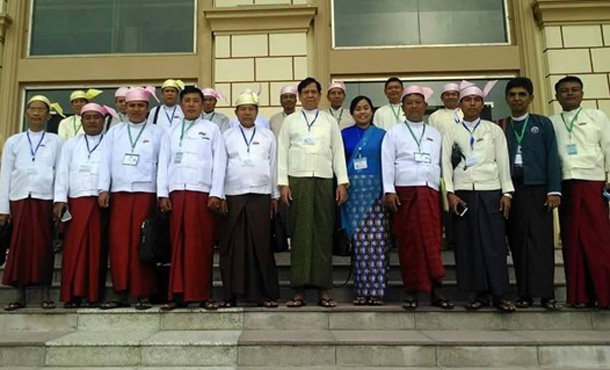RANGOON — Myo Kyaw, a central executive committee member of the Arakan National Party (ANP), has invited Arakanese civil society organizations to mediate current internal divisions of the ethnic party in Rangoon, a call which has been rejected by other members of the ANP leadership.
Myo Kyaw and five other central executive committee (CEC) members—once integral players within the former Arakan League for Democracy (ALD)—held a press conference on Sunday in Rangoon to object to the current practices and direction of the ANP. The following morning, ANP’s top leaders said that the CEC members had intentionally undermined the party’s rules and regulations.
The ANP won a majority of state parliament seats in November’s general election—44 out of the 77 contested—and is now boycotting any cross-party collaboration unless given permission to form its own state government.
Established in 2014 after merging the ALD and the Rakhine Nationalities Development Party (RNDP), it was hoped that the ANP’s formation would consolidate votes in the 2015 election.
The ANP’s vice chairperson Phoe Minn, a former RNDP leader, told The Irrawaddy on Tuesday that the ANP had already formed a team to investigate the CEC members and had summoned them to the Arakan State capital of Sittwe for questioning.
Myo Kyaw said he objects to the probe, pointing out that the leadership continues to clash along old party lines.
“The investigation process is led by the RNDP, so we deny it. We are going to invite some independent Arakanese organizations to facilitate [a discussion about] the dispute,” he explained.
Hla Maung Thein, chairman of the prominent Arakanese charity Rakhine Thahaya, said that his organization had not received an official invitation letter from the CEC members regarding a future mediation. His concern is that the recent friction is a result of misunderstanding within the ANP and that resolution of the controversy must not be rushed.
Pe Than, an ANP MP who is also on the investigation team, said that party principles must be adhered to, and it would be inappropriate to involve outside organizations in addressing internal party matters.
“I can’t say what could happen. There is no official announcement [about what happens to] disobedient members,” he said.
Pe Than assumes that if the former ALD members “confess their wrongdoing” and halt any further opposition to the investigative team, they will not be penalized harshly. According to the party procedure, the strongest potential outcome is dismissal.
The Irrawaddy asked Myo Kyaw what might happen if the ANP leadership overrides the suggestion to involve civil society in resolving the internal conflict and instead expels the CEC members.
“The ANP will be divided and it will collapse if they fire us,” he said. “This is not only about the perspective of six people, but also the huge number of supporters behind us.”
Khine Pyay Soe, leader of the ANP’s disciplinary committee, said that the secretariat and the party chairman, Dr. Aye Maung, have the right to determine a penalty for the six CEC members.
The Irrawaddy contacted Dr. Aye Maung by phone but he declined to comment on the situation.

















